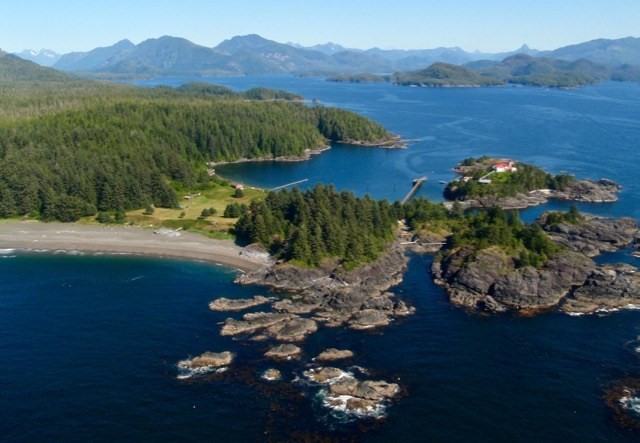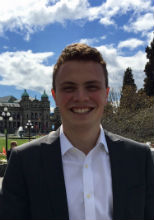It’s been an exciting and busy 2021 for the PRIMED team. As we approach the end of the year and the beginning of 2022, we wanted to look back and summarize some of our work over the past year.
We embarked on a front-end engineering and design study with the Mowachaht Muchalaht First Nation (MMFN) to assess the potential to power their traditional village of Yuquot on Nootka Island.
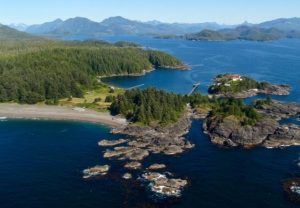
Aerial photo of Yuquot.
This project is a first-of-a kind wave energy project in BC while also contributing to the MMFNs goals for cultural resurgence and self sufficiency. PRIMED has been working with the MMFN, Barkley Project Group, Environmental Dynamics Inc., and South Korean wave developer INGINE on the project, which is expected to be completed in late 2022. Once finished, the MMFN will have all the necessary information including but not limited to annual power production, permitting requirements, costs, and more to make an informed decision whether to proceed with the 50-200 kW project. PRIMED’s roles include wave energy device modelling and optimization, deployment of wave buoys (completed) to enable resource characterization and to inform a high-resolution wave model, site selection (completed), grid integration modelling, project cost analysis, and more.
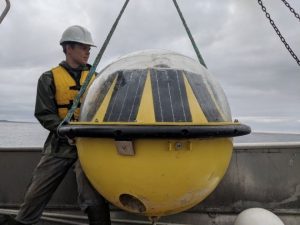
Deployment of one of two wave buoys near the Yuquot site.
Turning to tidal energy, PRIMED continues to work with the Ministry of Energy Mines and Low Carbon Innovation, Natural Resources Canada, Sustainable Marine Energy, Ocean Renewable Power Company, and MAVI Innovations to create a tidal energy test centre at Blind Channel (north of Campbell River). The site will serve as a demonstration site for up to two devices with a total capacity equal to 120 kW enabling community leaders to observe operational devices firsthand and examine results to determine if tidal projects are suitable for their communities needs.
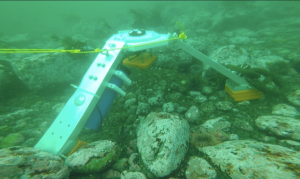
PRIMED ADCP Deployed at Blind Channel as part of the preliminary resource assessment work.
In collaboration with AXYS Technologies and Salish Sea Industrial Services, PRIMED deployed a FLiDAR buoy off the coast of Victoria at Trial Islands in November. Over its six-month validation deployment, the FLiDAR system will collect wind, atmospheric data, and current speeds before being utilized around BC to undertake wave, wind, and tidal resource assessments for coastal communities.
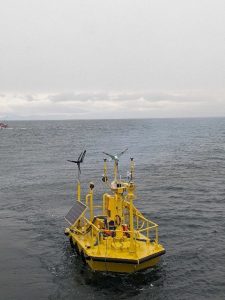
FLiDAR buoy deployed off of Trial Islands.
PRIMED researchers have also been busy with lab work at the Marine Technology Centre testing battery storage systems, assessing unit degradation, and optimizing our microgrid modelling in partnership with Rainhouse.
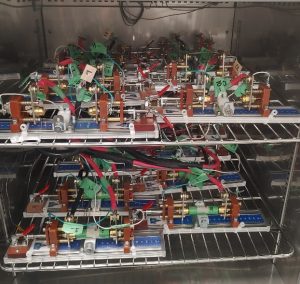
16 cylindrical 18650 battery cells prepared in thermal chamber for characterization testing.
Additionally, researchers are working on developing a standardized smart microgrid integration unit for marine renewable energy (MRE) systems in remote communities in collaboration with BMT and the Canadian Hydrokinetic Turbine Test Centre. These units can be adapted to various community specifications to ease challenges associated with the integration of multiple generation sources and to reduce costs.
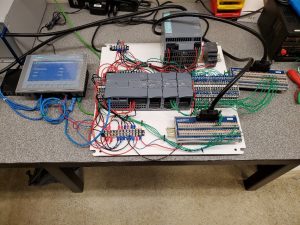
Microgrid interface control undergoing hardware in the loop testing.
Within the digital world, PRIMED continues to work with the National Research Council of Canada to develop the Marine Energy Resource Atlas Canada (MERACAN). Once completed, MERACAN will allow for a range of users from interested members of the public to technology developers, to extract and view information from MRE hind-cast models nested in the Atlas. The data is stored both spatially as well as temporally, which minimizes the processing power needed to extract data spanning long time ranges.
Looking ahead at 2022, PRIMED will continue to work on our existing endeavors along with starting new community led projects and beginning extensive field work and an MRE energy integration analysis on Haida Gwaii. We look forward to maintaining our ongoing collaboration with and support to First Nations and remote communities to assess the potential for MRE to offset diesel use and achieve their self sufficiency goals. Further, we will continue to engage with and support technology developers to optimize their devices and bring their ideas to fruition. Lastly, we will continue to work with government agencies to guide, update, and refine regulatory frameworks for MRE in BC and Canada to provide direction and clarity to the sector.
We would like to express our deepest thanks to all our partners and to PacifiCan and Natural Resources Canada for their generous funding. PRIMED is primed and ready for a big 2022!
